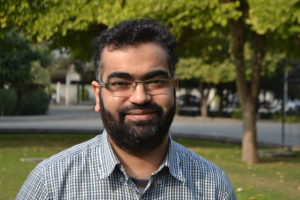Thursday, June 2, 2022
10:00 – 10:50 a.m. (CST)
ETB 1035 – **In-person**
Dr. Muhammad Awais Bin Altaf
Assistant Professor, Electrical Engineering
Lahore University of Management Sciences (LUMS), Pakistan
Title: “On-Chip Energy-Efficient Neural Diagnostics: Advancing Neuroscience through Wearable Devices”
Talking Points:
- Wearable Healthcare
- On-Chip Energy Efficient Digital Processing Techniques for ML algorithms
- Early Detection of Negative Emotion Outburst
Abstract
Artificial intelligence (AI) has influenced all aspects of human life and neurology is no exception to this growing trend. Today, neurology faces multiple challenges in the field of diagnostic and management modalities. This ranges from simple issues like identification of healthy sleep patterns to more complicated issues like early detection and reduction in the duration of rehabilitation of acute ischemic stroke diagnosis of rare subtypes of epilepsy. The increasing availability and progress of analytical techniques are opening new doors in health care. Machine learning, neural networks and other AI tools are used to classify the patient’s electroencephalogram (EEG) data to help neurologists in making an early diagnosis and improving care. Hence, the development of ultra-low-power System-on-Chip (SoC) for the next generation of the neuro-wearables, in the realms of detecting, diagnosing, and even preventing irreversible outcomes due to neurological disorders is essential. The uptake in the use of neuro-wearable technology by both patients and clinicians will have a huge impact on the future of healthcare.
This talk will cover the design strategies of energy-efficient patient-specific SoC biomedical devices. I will first explore the challenges, limitations and potential pitfalls in wearable interface circuit design, and strategies to overcome such issues. Moreover, I will describe on-chip energy-efficient digital processing techniques for the implementation of machine-learning algorithms for disease detection focusing on the negative emotion outburst early detection in Autistic patients. The talk will conclude with interesting aspects and opportunities that lie ahead.
Biography
Muhammad Awais Bin Altaf (S’11–M’16) received a B.S. degree from the University of Engineering and Technology, Lahore, Pakistan, in 2008, and the M.Sc. and Ph.D. degrees in microsystems engineering and interdisciplinary engineering from the Masdar Institute of Science and Technology (MIST), Abu Dhabi, United Arab Emirates, in 2012 and 2016, respectively. From 2012 to 2013, he was a Digital Design Engineer Intern at Design Solutions, Global Foundries, Dresden, Germany, where he was involved in the implementation of digital test chips in support of 20 and 14 nm technologies. In 2015, he was an exchange-Ph.D. a student with the Massachusetts Institute of Technology, Cambridge, MA, USA.
During his stay at MIST, he developed an energy-efficient machine-learning-based feature extraction and classification processor as well as a SoC for epileptic seizure detection. He is the recipient of the IEEE Solid-State Circuits Society Predoctoral award for his work on efficient machine learning hardware implementation for wearable healthcare in 2016. Since 2016, he has been with the Electrical Engineering Department, Lahore University of Management Sciences (LUMS), Lahore, Pakistan where he is currently an Assistant Professor. His current research interests include analog and digital IC design, energy-efficient applied AI and the development of ultra-low-power circuits and systems for wearable bio-medical applications.

Google Scholar: https://scholar.google.ae/citations?user=XVyrDmgAAAAJ&hl=en
In-Person @ ETB 1035 @ 10:00 a.m. on Thursday, 6/2/22
